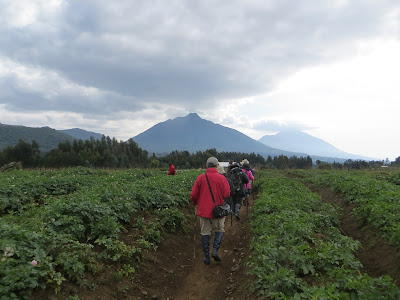I had meetings in the Maasai Mara this week, so I decided to spend weekend in a conservancy adjacent to the reserve. The taxi picked me up at 6
am for my flight and we were instantly in a traffic jam. Yes, 6 am in Karen. After crawling along the road for 45 minutes, the driver said 'do you think you are going to
make it?' That really calmed my nerves. We made it. Whisked into the
airport, got my ticket and boarded. Always hectic in Nairobi.
We landed on a grass strip in Siana Conservancy, a community owned conservation area east of the reserve. Stepping off the plane I could instantly breath. The stress of traffic, city, smog, moving all rolled off me. Coffee and muffins by the plane, it felt great
to be back in the bush. I stayed in a lovely camp
set in a valley surrounded by hills. It's been raining hard so it is very
lush and green. This is an odd time of the year for intense rains, but weather patterns have been thrown by El Nino and climate change.
Friday
afternoon we went for a bush walk, which is one of my favorite things to do. Seeing wildlife on foot is an entirely different experience and it is a luxury to get out of the vehicle and walk in the landscape. I was cognizant of the buffalo tracks everywhere. Abraham, a
Maasai dressed in a red Shuka (blanket) led us. He pointed out different trees and plants as we walked and explained how the Maasai use different leaves, bark and twigs for medicines and tools.
When he asked us if we knew what to do when a buffalo
attacks, some of the people in the group got a bit nervous. 'You should lay down,' he said, 'do not run.' Me, I knew I'd be right behind Abraham and his spear. During the walk we all kept glancing at the sky as it turned from a cloudy grey to a dark black. Some of the guests kept nervously looking up and saying 'perhaps we should head back?' I knew that the guides know the weather, they know the patterns of the sky. Just as the first drop fell, a vehicle emerged from the lodge and we were all inside when the skies opened. The rain was intense and as we sat bundled in Maasai blankets in the mess tent, it was lovely to watch.
Saturday morning I awoke at 5 am to a dark, yet clear sky. Coffee mug in hand, driving across the
plains with an orange sky as the sun rose--there is nothing better. Whenever I am in the Mara,
'god's country' always comes to mind. It is a place like no other. Even without the
wildlife, the vast open landscapes, rolling hills, tall grass, an
endless plain is awe inspiring. Breathless beauty.
We saw
a pride of six lions lounging on a beautiful rock outcrop, drying in the sun. There were two small
cubs whose faces melt you, still spotty in color. Their tan fur was damp
from the rains and they laid on the rocks soaking in their warmth and peering down at us with their
heads resting on their enormous paws. Gorgeous. The mother, a striking
female, sat properly on the rocks gazing over her pride.
Later we saw a
spectacular male leopard hanging in a tree, a classic scene that is often shown in books, but rare to see. His belly was absolutely full and hung to one side, while his legs straddled the branch. An elephant walked in
the distance and the leopard followed his movements. We had a lovely picnic in
the plains and I chuckled as our Maasai guide, Issac, an amazing
guide, whipped out his selfie stick for a photo. This was the first time I have ever been subject to a selfie stick and it was classic that it was a Maasai's.
Another
walk on Sunday. It was myself and a Maasai guide. I enjoyed talking with him as we strolled through the acacia woodlands, to hear about his thoughts on the conservancy, Maasai culture, the struggle to make ends meet, to decrease herd sizes as the grasslands are over grazed, to incentivize conservation and to commercialize meet production. We saw Giraffe, eland, zebra, impala and elephant. We ended the walk with sun-downers on a rock called Simba rock
overlooking the plains.
Later I was driven to another camp where I had meetings the following day. We drove along the east side of the Mara Reserve, in a remote area. On the
way we got stuck in the mud, really stuck in the mud. As we emerged from the vehicle Maasai started coming to the vehicle to see the problem. Soon they were gathering sticks, digging, pushing, jacking up the car to put branches under
neath. Of course, I stick out like a sore thumb, not only a mazungu (white) but a female by herself in the bush, so the kids had a ball
watching, touching and laughing with me. It was so very striking that these
communities live next to Kenya's most famous reserve, a cash cow, yet,
the children speak no Kiswahili, only Maa, a sign that they either have
bad schools or do not even go, despite primary education being free. One
girl, probably eight, carrying a baby on her back, her sister, spoke
Kiswahili and a few words of English. Obviously, something is not
working and if we are going to make conservation work long-term we need to figure out how to address these basic problems.





















